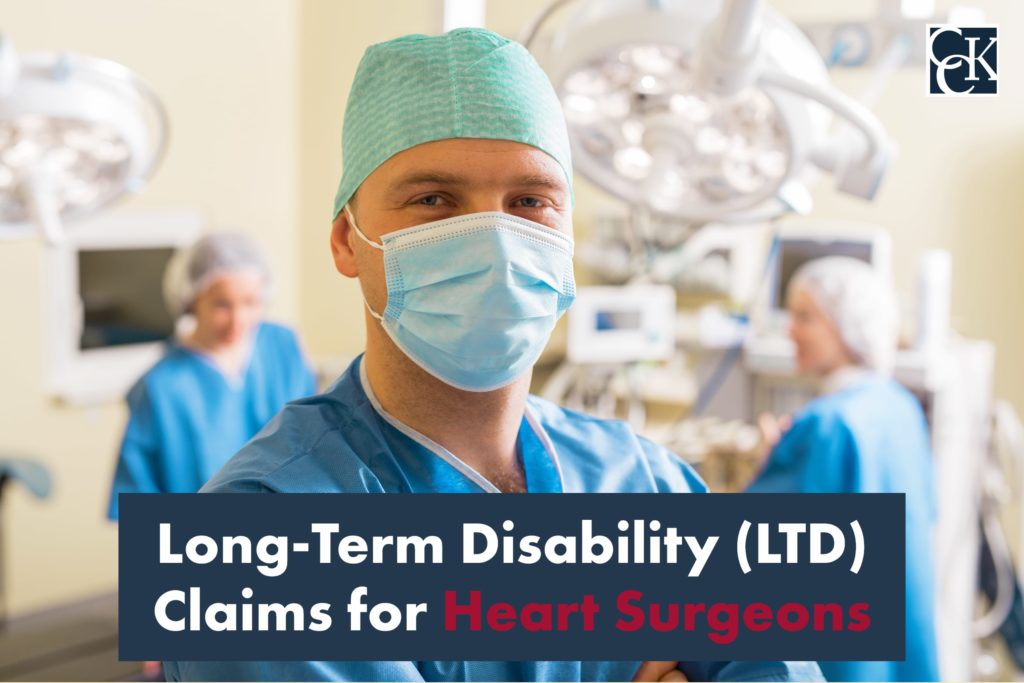Long-Term Disability (LTD) Claims for Heart Surgeons

Heart surgeons, also known as cardiac surgeons, specialize in the surgical treatment of the heart and its surrounding blood vessels. Many people rely on these highly trained and specialized doctors. When a heart surgeon develops a medical condition that impairs their ability to work, they can potentially put their patients at risk. Therefore, it is important for heart surgeons to file for long-term disability (LTD) benefits.
Filing an LTD claim and managing your health can seem overwhelming. The claim process can be complicated, too. This blog post will address a few of the questions you may have as a heart surgeon filing for long-term disability benefits.
How Can I Find Out More About My Long-Term Disability Coverage?
It is important to know what type of insurance coverage you have in case you need to use it someday. As such, understanding the coverage you have beforehand can help you prepare for filing your initial claim.

Nevertheless, there are generally two ways a person may get long-term disability benefits. First, they may receive LTD benefits as part of an employer-sponsored benefits package. Such plans are known as group plans, which are governed by ERISA law. Second, a person may receive long-term disability benefits directly from the insurance company. When a person buys disability insurance directly from the insurance company it is known as an individual (or private) plan. Moreover, it is possible to have both at the same time.
Generally, an individual plan is more tailored to what you need. This is because you can “shop around” for a policy that suits you, whereas a group policy is whatever your employer offers you. However, individual plans are generally more expensive per month than their group policy counterparts. Nonetheless, heart surgeons may have both to ensure the best possible coverage.
Figuring out which type of plan you have is simple. If you believe you have a group policy, you can ask your employer directly. Usually, you should contact a member of the human resources department. Once confirmed, human resources can send you your plan-governing documents
When you believe that you have an individual policy you should first check your financial records. If there are premium payments to an insurance company, then you most likely have an individual plan; you can contact the insurance company directly in this situation to obtain a copy of your policy.
Why Is It Important to Read and Understand My LTD Policy as a Heart Surgeon?
A heart surgeon has a very demanding job. Heart surgeons must perform many surgeries in one day, requiring steady hands and a clear mind. Moreover, stamina is important as you will routinely be standing for long periods. When a medical condition affects someone in this type of job, it can be devastating.
Several years of schooling and training are necessary to become a heart surgeon; it is a lifelong career. Therefore, when the job you have dedicated your life to becomes jeopardized, it can be overwhelming and difficult to handle.
It is important to read and understand your LTD policy as a heart surgeon because it will help guide you as you file your claim. Your long-term disability policy has a lot of invaluable information, such as the maximum benefit period; specific deadlines to which you must adhere; limitations and exclusions; your policy’s waiting period; how to appeal a denial; and more.

One of the most important pieces of information located within your policy is a definition of disability. This definition sets forth the level of impairment you must prove to receive LTD benefits.
Definition of Disability for Heart Surgeons
You must pay close attention to the definition of disability that is located within your long-term disability policy. There are generally two types of definitions of disability that you are likely to encounter: the own occupation and the any occupation definitions.
The own occupation definition asks whether the individual can perform the duties of their specific job only. In other words, if you were to develop symptoms that prevent you from conducting heart surgery then your policy would consider you disabled.
The any occupation definition can be more difficult to prove. This definition asks whether the individual can perform the duties of any job, not just their own. For example, if a heart surgeon had a back issue that prevented them from standing during surgery, but could still sit at a computer, they might not be considered disabled. Since they are able to do sedentary work, they could, theoretically, get an administrative job.
Some policies may include both definitions wherein an own occupation definition transitions into an any occupation definition after a set period—usually 12 to 24 months.
Establishing You Meet Your Definition of Disability
Thoroughly reviewing and understanding your LTD policy is crucial in establishing your claim. When you know your definition of disability, you know the threshold you must meet to prove your disability. This information allows you to collect the right evidence to submit to your insurance company.

Several conditions can render heart surgeons unable to fulfill their job duties. For example, if a heart surgeon experiences numbness in their fingers, they can no longer hold surgical tools with precision. Moreover, a condition such as degenerative disc disease can cause back pain that can make standing or sitting strenuous; this could make even sedentary work impossible.
Medical records are often your primary source of evidence. However, these records do not always tell the whole story. It is important to maintain an open line of communication with your treating physicians. Your physicians who are treating your especial condition can attest to how it impacts you and may be able to offer insights that normal medical records do not provide; therefore, it is important to request specialized reports from your treating physicians and submit them as supplemental evidence.
Additionally, outside expert opinions can help establish your disability. Sometimes insurance companies will require you to take an independent medical exam (IME), but these exams often benefit the insurance company, not the claimant. The reason? The doctors who perform these IMEs are normally paid by the insurance company and are therefore biased. Obtaining your own third-party assessments can illustrate the true nature of your condition. These assessments may include functional capacity, neuropsychological, and vocational evaluations.
Notwithstanding the evidence necessary to reinforce a claim, a heart surgeon does not need an extensive condition to qualify for disability benefits. Highly demanding professions—such as a heart surgeon—cannot be maintained with even minor ailments.
What Issues May a Heart Surgeon Face When Filing for Long-Term Disability Benefits?
There are several issues you may face as a heart surgeon filing for long-term disability benefits. It is important to be cognizant of these issues so that you may prepare yourself for when they arise.
Defining the Material Duties of Your Job
When evaluating LTD claims, insurance companies routinely use generalized job descriptions from the Dictionary of Occupational Titles, (fourth edition), which was last edited in 1991. However, this dictionary is not very detailed and often glosses over aspects of certain jobs. Sometimes a secondary resource, the O*Net Database, which is more up-to-date, is also used.
Regardless of where your insurance company gets its definition of your job, it is important to define the material duties of your job fully and accurately. A heart surgeon has a high-stress occupation that is both emotionally and physically taxing. These elements must be present when describing the full scope of your job. It is beneficial to take the time to make note of every aspect of your job as a heart surgeon to present as part of your claim.
Some definitions of disability may consider you disabled if you cannot perform some of the material duties of your job. However, this could mean that if you cannot perform surgery but can perform computer work, you are not disabled since you can still do some of the material duties of your job. Of course, this would signify that your policy adheres to an “any occupation” definition of disability, which is more difficult to establish.
Receiving a Denial of Your Initial Long-Term Disability Claim
It is possible that your insurance company will still issue a denial of your initial long-term disability claim. When a heart surgeon receives a denial of their LTD claim, it can feel demoralizing. The prospect of ever receiving benefits may seem distant. However, this does not mean you will not receive benefits.

When you receive a denial, you have the right to appeal. Appealing a denial of your claim is a crucial part of the long-term disability claim process.
If you discover that you have a group policy, this administrative appeal stage is vital because, under ERISA, you may not submit new or updated evidence after this stage. This means that if your appeal were denied, and you had to bring it to court, you could not present new evidence to prove your case.
When appealing a denial of a claim, it is important to submit updated evidence. This means rescheduling outside evaluations and obtaining new specialized reports and witness testimonies.
What Other Benefits May Be Available to Heart Surgeons?
Heart surgeons may have several options available to them. In addition to long-term disability benefits, heart surgeons may be eligible for Social Security Disability Insurance (SSDI).
SSDI has its own set of requirements. If you cannot perform your job, your disability is expected to last a year or more, or your disability could result in death, you are normally eligible.
However, the rules governing SSDI differ from those governing LTD, meaning the definition of disability may also be different. For example, under your LTD policy, you may be considered disabled; yet the same condition may not be considered disabled under SSDI, and vice versa.
Call Chisholm Chisholm & Kilpatrick Today for a Free Case Evaluation
Regardless of where you are in the process, you do not have to do this alone. Filing for long-term disability benefits as a heart surgeon is daunting. There are many things to worry about, but the legal team at Chisholm Chisholm & Kilpatrick is here to help. We want you to focus on managing your condition while we take over your claim.
It is important that your insurance company handles your claim fairly, and CCK will ensure that they do. Call us today at (800) 544-9144 for a free case evaluation with a member of our team. We will evaluate your claim and see if we may assist you.
About the Author
Share this Post

